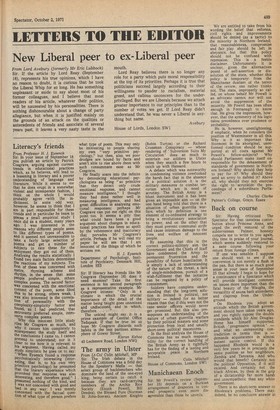Literacy's friends
From Professor H. J. Eysench
Sir: In your issue of September 18 you publish an article by Patrick Cosgrove, arguing against current trends in educational practices which, as he believes, will lead to a lessening in literacy and a poorer understanding of language and literature. While it seems to me that he does erupt in a somewhat violent and intemperate fashion, I think on the whole I would probably agree 'with the indictment. In some odd way, however, he seems to think that I am in part responsible for these trends and in particular he tears to Pieces a small empirical study I once did as a student, many years age. I was interested in the reasons why different people seem to like different types of poems, and it seemed not unreasonable to take a fairly large selection of Poems and get a number of subjects to rate these for the enjoyment they got out of them. Analysing the results statistically I found two main factors determined the reactions of my subjects. The first of these was concerned with metre, rhyming scheme and rhythm, in the sense that some People preferred simple, others complex poems. The second factor was concerned with the emotional content of the poem, some liked this to be strong, others weak. I was also interested in the correlation of personality with the complexity-simplicity factor and found, as I had predicted, that extroverts preferred simple, introverts complex poems. Why this innocent little study riles Mr Cosgrove so much, and why it causes him completely to misrepresent the study itself and the conclusions I came to, I cannot pretend to understand; nor is it clear to me how it is relevant to his argument. Having called my study simplistic he goes on to say: " When Eysenck found a response psychologically interesting (interesting, that is, to his own very Primitive psychology) he presumed that the literary experience which provoked that response was also interesting, and therefore good." I presumed nothing of the kind, and I was not concerned with good and bad in any way: I was merely concerned with the factual question of what type of person prefers
what type of poem. This may only be interesting to people sharing my own "very primitive psychology," but then, alas, we poor drudges are bound by facts and aren't able to rise above them with such consummate ease as Mr Cosgrove.
He finally soars into the infinite by denouncing educational psychologists as being "so primitive 'that they detect only crude emotional response, and cannot measure intelligence." I thought they had done rather well in measuring intelligence, and had great difficulties in analysing emotional responses; perhaps Mr Cosgrove can put me right on this point too. It seems a pity that what could have been a good argument about changes in educational practices has been so spoilt by the vehemence and inaccuracy that pervades Mr Cosgrave's article. Perhaps if he will read my paper he will see that I am innocent of the things of which he accuses me.
H. J. Eysenck Department of Psychology, Institute of Psychiatry, Denmark Hill, London SE5
Sir: If literacy has friends like Mr Cosgrove (September 18) does it need enemies? Take the first sentence in his second paragraph as a representative example. Mr Cosgrove intones: "Only in a climate in which the crucial Importance of the detail of the matter being taught goes unnoticed and undiscussed, and in which, therefore. .
The unkind might say it is a prime example of Central Office Tedspeak. If that be true let us hope Mr Cosgrove discards such habits in the less partisan atmosphere of Gower Street.
Kieran Kehoe 45 Lechmere Road, London NW2
































 Previous page
Previous page